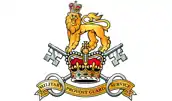Military Provost Guard Service
The Military Provost Guard Service (MPGS) is responsible for maintaining physical security at British Armed Forces locations throughout Great Britain. It is one of three constituent units of the Adjutant General's Corps Provost Branch (the other two parts being the Royal Military Police and the Military Provost Staff). The Provost branch is the responsibility of the Provost Marshal who is a Brigadier from the Royal Military Police. The MPGS also works alongside the unarmed Ministry of Defence Guard Service (MGS). In Northern Ireland, armed security at Ministry of Defence establishments is provided by the uniformed civilian Northern Ireland Security Guard Service in a similar manner to that of the MPGS in Great Britain.
| Military Provost Guard Service | |
|---|---|
 Former Cap Badge of the MPGS, with the no longer used St Edward's Crown | |
| Country | |
| Branch | |
| Role | Armed Guarding |
| Commanders | |
| Current commander | Provost Marshal (Army) |
| Colonel of the Regiment | King Charles III |
| Insignia | |
| Tactical Recognition Flash |  |
History and operational role
_of_the_Military_Provost_Guard_Service_(MPGS)._MOD_45159321.jpg.webp)
Duties
The MPGS was formed in the wake of structural changes of the Armed Forces and the increased threat of terrorism in 1997.[1]
The MPGS's duties include:[2]
- Controlling entry and exit access to a site
- Managing control room operations and ensuring all visitors are dealt with efficiently
- Patrolling site perimeters and taking necessary action to preserve perimeter security
- Security incident management, such as suspicious packages, bomb threats, protests, etc.
- Military Working Dog services at some sites.
Personnel
To join the MPGS, applicants must have served for at least three years in any arm or service, including the Royal Naval Reserve, Royal Marines Reserve, Army Reserve, and Royal Auxiliary Air Force. They must have completed that service within six years of application to the MPGS, unless they have relevant service in the Police or HM Prison Service since leaving the armed forces.[3]
To join, they have to re-enlist into the Regular British Army on a Military Local Service Engagement (MLSE). The MLSE is a form of engagement which is ideally suited to use by the MPGS. It is renewable on a three-yearly basis providing the soldier continues to meet the requirements and standards of the service, as well as there being a continued need for MPGS soldiers at that particular unit.[3]
Training
All MPGS soldiers are trained at the Defence School of Police and Security (DSPS), part of the Defence College of Logistics, Policing and Administration (DCLPA).[4]
Their training includes:
- Powers of arrest
- Powers of search
- Use of force
- Patrolling techniques
- Incident handling
- Notebook instruction
- Maintenance of Occurrence Books
- Maintenance of Security Registers
- Processing telephone calls
- Accounting for security equipment
- Weapons handling
- Marksmanship, including live firing
- Judgmental assessment.
Relationship with other agencies
There are 26 police constabularies that currently have a Memorandum of Understanding (MOU) with the Military Provost Guard Service in respect of the legal authority for carrying firearms on UK roads.[5]
Locations in the United Kingdom
The British Army website publishes a list of MPGS UK locations.[6]
Royal Navy (including Royal Marines) locations
There are 14 Royal Navy/Royal Marines locations where the MPGS provide security.
British Army locations
There are 84 British Army locations where the MPGS provide security.
Royal Air Force locations
There are 23 Royal Air Force locations where the MPGS provide security.
UK Strategic Command locations
There are 8 Strategic Command locations where the MPGS provide security.
Equipment
._MOD_45159322.jpg.webp)
The main firearm used by the MPGS is the SA80 L85A2 assault rifle; Glock 9 mm semi-automatic pistols may also be used. All MPGS soldiers must pass a weapon handling test biannually to use firearms.[7]
Vehicles
Some vehicles have an amber strobe beacon on the roof for increased visibility. In late 2013, the Ministry of Defence purchased Ford Ranger pickups for use within the MPGS and other MOD departments.[8]
See also
- Commandant's Service – a similar Russian organisation
- Ministry of Defence Guard Service – a similar (unarmed) Civil Service organisation in the UK
- Military Provost Staff Corps – the Army's equivalent of a prison service
- Adjutant General's Corps – the parent Corps of the MPGS
- Military Police of the United Kingdom – the collection of Service (military) Police in the United Kingdom
References
- "MoD Police and guarding". UK Parliament. 10 March 1999. Retrieved 2 October 2016.
- "Military Provost Guard Service". Ministry of Defence. Retrieved 30 August 2013.
- "Military Provost Guard Service at RAF Marham". RAF Marham website. Ministry of Defence. Retrieved 30 August 2013.
- Adjutant General's Corps, Provost Branch. "Military Provost Guard Service". army.mod.uk. Retrieved 13 June 2023.
- "DO Letterhead (Andover) Outside MOD". Whatdotheyknow.com. 17 November 2010. Retrieved 17 August 2012.
- Adjutant General's Corps, Provost Branch. "Military Provost Guard Service". army.mod.uk. Retrieved 13 June 2023.
- "Military Provost Guard Service". Parliamentary Debates (Hansard). 24 July 1996. Retrieved 2 October 2016.
- "Ford Ranger pick-up joins the military | Car News, Reviews & Buyers Guides". Perrys.co.uk. 6 November 2013. Retrieved 27 September 2016.